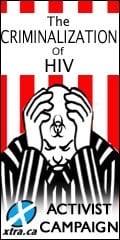
Credit: Ken Bosem illustration
In the 1999 Cuerrier decision the Supreme Court of Canada ruled that people who fail to tell their sex partners that they are HIV-positive before having unprotected sex with them could be charged with sexual assault under the Criminal Code.
On Oct 6 of last year the trial of Johnson Aziga began in Hamilton. As Xtra goes to press the trial is ongoing. Aziga is accused of failing to disclose his HIV-positive status to at least 13 women before having unprotected sex with them. Two of the women reportedly later died of HIV-related cancers. Aziga is charged with one count of first-degree murder in connection with each of their deaths. He is the first in Canada to face murder charges for HIV nondisclosure and a conviction in his case would have enormous implications for AIDS activists, gay men, women and people of colour.
In a just culture we must carefully differentiate between criminal actions and those that are simply deplorable. If the allegations against Aziga are true, he committed a despicable act. But deception — a choice to lie about (or deny the reality of) your sexual health — is one thing; murder is another thing altogether.
I do not of course mean to minimize the tragedies lived by the poor women who died. It is the moral principles behind the criminalization of HIV that concern me.
If there is any lesson to be learned from horrible scenarios like those raised in the Aziga case, it is that no one can be counted on to tell the truth about sex. And as much as it may satisfy a deep, obsessive, all-too-human longing for justice it is irresponsible to blame one person for another’s death from disease. We don’t charge those who refuse treatment or counselling for tuberculosis or hepatitis under the Criminal Code. We don’t see sensationalized news accounts or manhunts for those suspected of transmitting syphilis or human papilloma virus. We don’t expect murder or assault charges against any store clerk who knowingly sells cigarettes to children. It would naturally be ridiculous and unjust to do so.
The faulty moral reasoning involved here is not the only issue. The Aziga case has staggering racist, sexist and homophobic implications as well.
***
Aziga is Ugandan. In the late ’80s Charles Ssenyonga, another Ugandan, became one of Canada’s first AIDS criminals. He too was accused of knowingly infecting women with HIV. Canadian journalist June Callwood attacked Ssenyonga in her 1995 bestseller, Trial Without End: A Shocking Story of Women and AIDS.
Click here to find out how you can take action
Among those who have been charged with spreading HIV in Canada there are at least three much-discussed cases involving black men, including well-known Canadian Football League player Trevis Smith.
The fantasy of the black male as AIDS killer and rapist is rooted in a deep-seated North American suspicion that black men are dangerous to white women. This fantasy sells books, newspapers and magazines and it allows some to conclude that, by not disclosing his HIV status, Aziga committed rape.
I say that criminalizing HIV-positive men who fail to disclose to female sex partners only serves to disempower women. If men are to be held entirely responsible for disclosure, it implies that women don’t have complete responsibility for their bodies, choices or sexual health.
What happened to our bodies, our choice? Women are not — under the law or otherwise — passive, mute playthings.
Safer sex is about the liberating notion that all people — male and female, top and bottom — are either responsible to protect themselves by insisting on safer sex or to assume the risk that they may become HIV-positive if they don’t.
Nobody deserves to become HIV-positive but Aziga’s so-called victims could have chosen to insist on the use of condoms.
***
For gay men the most compelling argument against the criminalization of HIV is the propensity of those who hate us to use AIDS fear as a weapon against our civil liberties. The rhetoric employed against Aziga is the same used to characterize gay men as dangerous: That promiscuous gay men are filthy purveyors of disease bent on recruiting innocents; morally bankrupt subhumans with no ability to control their disgusting carnal desires. Good and decent people need to draw the line. They must be rooted out and stopped.
Fear and revulsion about gay sex is at the root of that hatred.
McGill University AIDS Centre director Mark Wainberg wrote a striking example of this in his essay, The Virus that Won’t Go Away, in The Globe and Mail last year.
“This issue of nonfidelity is, of course, at the heart of the problem, as exemplified in almost all Western countries by the fact that a majority of new HIV transmissions now occur within gay male populations,” he wrote.
Ridiculous. I called him on his bigotry in a rebuttal piece in The Globe.
“Not all people who get AIDS are libertines, and not all learn redemption,” I wrote. “North American (mainly white and heterosexual) AIDS scientists — somewhat overzealously, I think — analyze lifestyles and collect data about the sex lives of gay men and Africans, meanwhile convincing everyone that their lurid invasions into the privacy of their subjects is about saving lives. But is it merely a coincidence that a transhistorical fear of same-sex desire among males and the Western obsession with colonizing Africa have merged to become a single discourse called The War on AIDS? Even if scientists were to find out conclusively that white heterosexual North Americans are models of monogamy, attempts by crusading colonizers to teach the rest of the world abstinence are historically doomed to failure. Human beings are sexual (which sometimes means promiscuous) and even an evangelical devotion to transforming the aberrant sexualities of mankind will not change that, or the course of this disease. Nonjudgmental, factual information based on conclusive scientific evidence can, has and will.”
“I am among the few in the HIV field who have publicly espoused both same-sex marriage and the right of uninfected gay men to donate blood,” wrote Wainberg in response. “The appropriate noncondescending phrase to characterize my strong language in advocating for safer sex practices among gay men, whom I cherish and respect, is probably ‘tough love.’”
Unfortunately this arrogant paternalism — tough love — is just a short step from persecution of homosexuals for our dangerously randy ways. There was a time in the very recent past when it was perfectly acceptable in Canadian society to treat gay men — for our own good — with chemicals and psychotherapy. There was a time when gay sex was criminal.
Wainberg still holds tight to his position that promiscuity is a villain in the fight against HIV. But even he has come to believe that criminalization is not part of the solution.
In a December 2008 editorial in the journal Retrovirology, Wainberg finally adds his voice to the growing chorus of activists and researchers who recognize that criminalization is ineffective and dangerous.
“We need to recognize that the current criminalization of HIV transmission is not doing any good and, probably acts as a deterrent to HIV testing, thereby, in effect, promoting HIV transmission by people who do not know or don’t want to know that they are infected,” he writes.
But Wainberg doesn’t let go of his misguided view that promiscuity is at the root of the issue.
“How can society resolve this problem, while not, in effect, encouraging sexual promiscuity and risk behaviour?” he writes.
***
Homophobia unleashed by the criminalization of HIV isn’t the exclusive domain of heterosexuals. Some gay men are deeply frustrated with other gay men who fail to disclose. These days too many upscale fags imagine themselves as good, monogamous gay men and feel no compunction about demonizing bad, promiscuous gay men.
If Aziga is convicted many more gay guys will feel empowered to accuse their ex-partners of aggravated sexual assault. Gay men who do this unwittingly endanger their own civil liberties.
In the face of all this nonsense the AIDS service community has so far been too timid in its objections to criminalization and the charges against Aziga.
“Using the criminal law in this kind of way is not particularly helpful,” Richard Elliott, executive director of the Canadian HIV/AIDS Legal Network, told the Canadian Press after Aziga was charged.
“What we’re questioning is the suitability of using the criminal justice system this way,” said Betty Anne Thomas, then executive director of the Hamilton AIDS Network.
A conviction in the Aziga case will only complicate HIV-prevention efforts and make the things worse for those living with the virus.
I challenge jurists, HIV/AIDS service organizations, HIV/AIDS researchers and everyone who is living with HIV to do the right thing: Condemn the criminalization of HIV in all its forms. Declare unequivocally that it is an approach that does not work and that only perpetuates injustice. Demand that Aziga be acquitted of the charges against him.

 Why you can trust Xtra
Why you can trust Xtra


